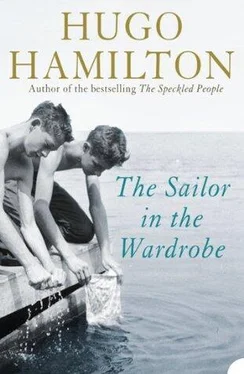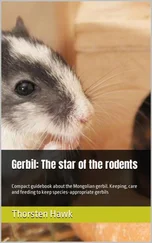Tante Käthe hardly eats any of the sandwiches or the cakes that my mother makes. She sits forward in her chair when the Gardai arrive, as if she will have to stand up at any minute and go with them. They speak slowly to her in English to make sure that she understands. They accept a photograph of Stefan that she has brought with her and they agree that it might be a good idea, in time, to place a few posters in the shops and petrol stations around the country, but it’s hard to know where. They ask if Stefan was of an unhappy disposition. Was there anything that he might be running away from. They explain that they are still actively pursuing the disappearance, but there is little more they can do. It makes no sense to broadcast any further missing person messages on the radio and there is nothing to be gained from starting a full-scale search, because nobody would know where to look first. When the Gardai leave again, my mother and Tante Käthe both come out of the front room as if Stefan’s disappearance has brought back all the other tragedies of Germany, all the hurt and longing which they have had to suppress all these years since they last met in Mainz.
To cheer everyone up, my mother talks about how safe Ireland is and how she was able to cycle around on her pilgrimage without ever being bothered or being afraid of anyone. Ireland was like a fairy tale when she arrived first. Tante Käthe remembers all the letters that my mother sent back, how you could leave your belongings on a rock while going for a swim and nobody would take them. It was a religious country, full of people who stopped to bless themselves as they passed by a church. My mother wants Tante Käthe to see the place for herself so that she will be less worried. They both take the bus into the city to have coffee in Bewleys, to look at the stained-glass windows and the three-tiered trays of cakes on each table. My mother comes back and imitates the way that the waitress in her apron says ‘Did you have any cakes, Madam?’ with a small pinched mouth. My father becomes a tour guide again and offers to drive them down to Glendalough to see the round tower and I think they want Tante Käthe to be glad that her son is missing in Ireland, not somewhere else.
‘He doesn’t understand the sea,’ Tante Käthe says.
Everyone knows that Stefan is a strong swimmer, but that doesn’t mean he can’t be tricked into swimming somewhere that looks calm, but which has dangerous currents that can tow even the best athlete in the world out to sea. My mother always told us to find some local person and inform them we were intending to go for a swim, because you could never tell what the conditions were like around the west coast. I always thought it was funny to go up to somebody and say we were going for a swim, because they might look at me in a strange way and say: Good for you. And good luck to you. Now she tells Tante Käthe that she gave Stefan the same warning and that surely means he is careful and that everyone from Spanish Point all the way up to Bundoran knows about every time Stefan has gone for a swim.
‘The Atlantic. It’s not like a big swimming pool,’ Tante Käthe says, and you can see her imagining things that have not happened yet. She has the same nightmare factory that my mother has, from the war and the bombing. They are both still in the pre-calamity moment, thinking of bombs in mid-air that have not fallen yet, of murders that have not happened, of pre-drowning stillness when the sun is going down and gives the sea a peaceful look that cannot be trusted. Even though my mother has been living in Ireland for a long time and has got used to the Irish truth, she still can’t help thinking that no matter how many good things have happened in the meantime, something bad is on its way in the end.
My mother asks me to tell Tante Käthe about my trip to the Aran Islands and how safe it was there. She takes out the diary and shows off all the postcards that Franz and I sent home when we went on a cycling trip around Ireland alone. She wants us to tell the whole journey, how we cycled down to visit our relatives in West Cork one summer and stayed in youth hostels along the way, how we sent a postcard home every morning, just like my mother did, sending daily letters home to Kempen when she arrived in Ireland first. She points out the map and the route we followed in red pencil, with little green flags in all the places where we stopped. There are notes in the diary on all the distances we travelled, including the mileage we travelled one day when we took a wrong turn and had to come all the way back again. The distances were all added up and the total mileage was written at the bottom of the page, underlined and followed with exclamation marks to show how impressive our journey was.
We told Tante Käthe about the most beautiful sight of all, the Rock of Cashel, how you come cycling around the bend and the ruins of this monastery just come into view as if you’re the first person to discover it. We told her how we had sent Stefan down that road to Tipperary to find it for himself. We described how we cycled against the wind along the road from Urlingford, how Franz was always ahead because he was a stronger cyclist and never lost his energy, how I was always behind because I had the weakness and wanted to lie down by the side of the road, until Franz came back to encourage me and the energy returned to my legs when we came around a bend and saw the stone monastery clustered on the top of the rock. I forgot my weakness and cycled urgently back in time, as if I remembered it, as if I had been here before, hundreds of years ago.
Tante Käthe listens to every detail, how we prepared for the journey, how my father discussed the route with us, just like he did with Stefan, pointing out all the towns on the map that were of interest to us. My father didn’t say much about the town of Leap where he was born and brought up with his brother Ted, but he told us where our relatives were living in Tipperary Town and Middleton and Skibbereen. He sat down with us and told us how he cycled from Dublin to Leap to see his mother while he was a student and could not afford the train. I heard him talking about his own life for once, without looking into the future. I heard him telling us about the time he went swimming once near Glandore and his brother, Onkel Ted, had to rescue him when he got into difficulty. He told us how he remembered seeing British soldiers along the road. He remembered hearing about an officer in the Auxiliaries, the Black and Tans, who was thrown out of the pub in Glandore for being so drunk and abusive and came back with a hand grenade which he threw onto the roof of the pub, but it rolled back down again and exploded right beside him, and he was killed by his own rage. He remembered hearing gunfire in the hills behind Leap. He told us how he saw Michael Collins stopping to visit friends in Leap, right across the street from where they lived, on the afternoon before he drove on to Béal na Bláth where he was killed.
We sat in the front room on the evening before we started the journey and it was strange to think of my father as a boy in short trousers. My mother made sandwiches and cake that would last us about four days at least. It was long before I started earning my own money at the harbour and my father calculated the amount we would need per day, the amount he used when he cycled all the way down to West Cork as a student. Then he added a shilling on top to make sure we would not go short. Franz was in charge of the money and he wanted to spend as little as possible, to bring back as much as we could so that my father would be impressed and would allow us to go on another journey because we knew how to live on nothing.
The night before we left on that big journey, he told us a story that he wanted us to keep with us for the rest of our lives. It was the story of the landlord and his fiery carriage.
Читать дальше
Конец ознакомительного отрывка
Купить книгу












